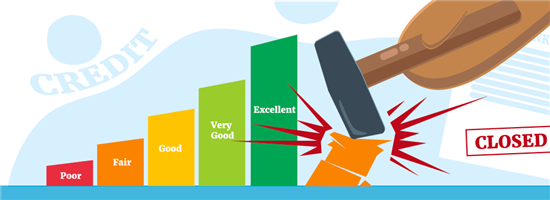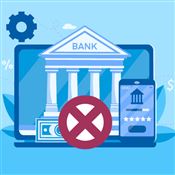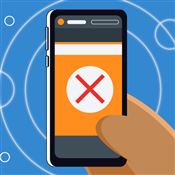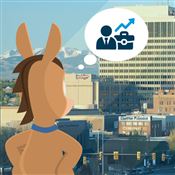Does Closing a Bank Account Hurt Your Credit?
Closing your bank account will not necessarily hurt your credit. But, there are instances where it can. Read on to find out.
 |
Closing a bank account you frequently use can be quite complicated. You have to wait for certain transactions to clear while worrying about the potential impact on your credit score.
But should you really be concerned about your credit taking a hit? Find out why you generally shouldn't worry and how you can prevent any negative effects.
Does Closing a Bank Account Affect Your Credit?
Closing a bank account, especially one in good standing, will generally not affect your credit. But, if you have a negative balance, not paying what you owe to the bank can lower your credit score.
Since checking and savings accounts are not debts like loans and credit cards, banks don't typically report deposit or investment transactions to credit bureaus. The important thing for these lenders is how well you repay debts, not your everyday banking activities.
But, when you do close a bank account, it will likely reflect in your ChexSystems reports along with your banking history.[1]
A ChexSystems report focuses on your banking history, including any negative items that may have occurred along the way. This is what banks usually check before they approve your account opening.
Why Did Your Credit Score Drop When You Closed Your Account?
If you have an overdrawn account and unpaid balances upon closure, your credit score can be negatively impacted. Failure to clear out unsettled amounts would translate to outstanding debts.
The bank may then seek the services of a collection agency to recover the balance. In turn, this agency may report such occurrences to credit monitoring services.
So, your credit score will only be affected if you have unsettled debts in your closed account. But, if your account is in good standing, you don't have to worry too much.
You can file a dispute with the credit reporting company if there is any inaccuracy or incorrect entry in your credit report.[2] Provide supporting documentation or evidence to prove your claim. If no corrective action was taken, you may file a complaint with the Consumer Financial Protection Bureau.
How to Close Your Account Without Hurting Your Credit Score
Closing an account typically doesn't affect your credit score, and you can ensure it won't by following these three steps:
- Review your account details.
Look for any pending transactions, such as direct deposits, outstanding checks, or automatic payments in your account. If you find any, clear them first then update your new account to minimize disruptions. - Check your balance.
If your account still has money in it, you can withdraw from an ATM or branch, transfer it electronically, or request a check. Close your account immediately after to avoid fees. If it is in the negative, deposit enough to cover the balance and fees, bringing it to zero before closing. - Verify your closure.
Ask for a confirmation letter from your bank that they have indeed closed your account. This will give you peace of mind knowing everything is in order and you can move on.
There are some cons when you close a bank account. One is if you do it too soon because you will likely pay an early account closure fee. This action may also be reflected in your ChexSystems report, which can affect your future bank account applications.
How to Safeguard Your Credit When Closing a Bank Account
Now that you are aware that unpaid balances in the account potentially affect your credit, here are practices that can help you prevent that.
- Do not overuse your overdraft protection.
If you have an overdraft protection plan, it would be best to use it for emergencies only. Fund your account on time to prevent accumulating overdrafts that could affect your account standing while it's still open. - Continue monitoring your account.
If your checking account has no minimum deposits, keep it open for a few months to ensure your recurring transactions have stopped. This allows you to identify any irregularities that might lead to an unpaid negative balance if overlooked. - Arrange a repayment plan with the bank.
Closing your bank account doesn't erase unpaid obligations; you must pay any outstanding amounts and fees to prevent them from being reported to credit bureaus. If you can't settle them right away, check if your bank is willing to agree on a manageable payment solution.
Yes, you can open a bank account even if you have bad credit. However, those with low credit scores are likely to have overdrawn accounts, which can cause a negative entry in your ChexSystems report. If the bank sees this, they may deny your application.
Why Do People Close Their Bank Accounts?
The following are some reasons why people voluntarily close their bank accounts:
- Found a better bank
- Unhappy with service
- Financial difficulty
- Relocating to another city or state
- Streamlining of accounts
- No longer using the account
The following circumstances may prompt a bank to close your account:
- Account inactivity
- Frequently overdrawn account
- Suspected fraud
- Breach of the account agreement
- Death of account holder
Frequently Asked Questions
What happens when a bank closes your account?
If you still have money in your account upon closure, you'll get your funds back after they deduct relevant fees. Usually, the bank will send you a check via mail. This applies to any automatic deposits made after the account is closed too.
What if your account gets closed with a negative balance?
If your account has a negative balance upon closure, the bank will ask you to pay the outstanding amount and possible penalties. If you can't pay, your debts may go to a collection agency, harming your credit score.
Will closing unused bank accounts help my credit score?
Whether you have had a lot of activity in your bank account or barely used it, they won't positively impact your credit score. But paying your loans on time, maintaining low credit card balances, and having a long history of good credit management will.
Bottom Line
Closing a bank account can harm your credit only if you ignore overdrawn balances. So, make sure to pay any outstanding amounts and fees to avoid this.
Meanwhile, if your account is in good standing and you want to close it for personal reasons, you can do so without worrying about your credit being affected.
References
- ^ ChexSystems. FAQ: What type of information could be included in my consumer file?, Retrieved 12/12/2023
- ^ Federal Trade Commission Consumer Advice. Disputing Errors on Your Credit Reports, Retrieved 12/12/2023
Write to Penelope Besana at feedback@creditdonkey.com. Follow us on Twitter and Facebook for our latest posts.
|
|
|









